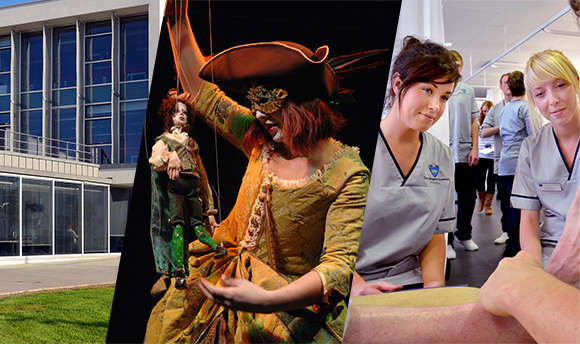Professorial Review Policy and Procedure
Policy Summary
The Professorial Review Policy and Procedure provides guidance on the principles and procedure of the Professorial Review process within QMU
Policy Owner: Human Resources
Approved By: Executive Board - 1 February 2013/8 November 2019
Equality Impact Assessed: 29 January 2013/9 Feb 2015
Date of Issue: 1 Feb 2013
Review Period: Annual or as required by legislation
Last Review Date: November 2019
1.0 - Introduction
The remit of the Professorial Review is:
- To consider applications from Academic members of staff who wish to apply for the title of Professor.
- To provide a means of recognising the outstanding contribution made to the University by its Professors with regards to learning and teaching, academic leadership, research and knowledge exchange and income generation.
2.0 - Professorial Review Panels
There are two Professorial Panels, one for School of Arts, Social Sciences and Management and one for School of Health Sciences.
The Professorial Review Panels will comprise of the Principal, Deputy Principal, Dean of School, HR Representative (panel Secretary) and one external member.
The Professorial Review Panel will meet annually as part of the Reward and Recognition cycle.
Arrangements in place for determining the salaries of those senior staff with Professorial title are reviewed annually by the Senior Management Remuneration Committee of the University Court.
3.0 - Procedure - Applications for Professorship
Step 1 – Applicant’s Actions
Where a member of staff is considering the submission of an application, the first step is to review the criteria set out in the Professorial Review Policy and Procedure. They should then arrange to meet with their Head of Division to discuss a potential application. In preparation for that meeting, the applicant is encouraged to carry out a self-assessment exercise against the criteria which is a very helpful basis for discussion with the Head of Division.
Career aspirations recorded as part of the Performance Enhancement Review (PER) discussion should also be taken into consideration. Further information is available in the QMU PER policy. Having decided to proceed with an application, the applicant should email Human Resources to note their expression of interest in applying.
The employee should then proceed to consider the preparation of their application. All applications should be submitted via YourContribution. The full application comprises the following:
Application Form:
- The purpose of the application form is to allow the applicant to summarise the main grounds on which the application is being made. The form enables applicants to evidence how their achievements meet sufficient criteria set out in the Professorial Review Policy and Procedure.
If the applicant has previously applied for promotion to Professor, they should demonstrate how they have constructively used the feedback given following their application and also outline what they would do next and offer to QMU if they were to be successful. The application form will be made available to the applicant’s external Referee and Assessor.
Where an application is put forward primarily on the basis of excellence in teaching this should be stated in the application form. It is important in this instance that applicants think about the evidence they are going to bring forward to support their application. Applicants should consider cross-referencing their application to the Student Experience Strategy and the process for application to the Higher Education Academy.
The applicant should use the relevant section of the application form to note contact details of one external Referee who may be contacted by the Dean and asked to assess the applicant’s suitability for promotion alongside the criteria. The completed application form will be made available to the applicant’s Referee and the Dean’s independent external Assessor.
A Curriculum Vitae:
- The curriculum vitae should be in the University format, attached as Appendix 4. Applicants must include the number of pages in articles, books and any other publications. It is not appropriate to include a list of citations. In detailing grant applications, the applicant must also set out the proportion or the aspect of the grant application for which they are responsible.
The applicant’s role in the grant application must also be noted e.g. Principal Investigator, collaborator or grant holder. If applicants list multi-authored publications in their record of publication, (a) the order in which the names of the authors appear should be identical to that on the publication itself; and (b) applicants must specify the proportion of the publication for which they were responsible, or should specify the nature of their contribution to it.
The font used should be Ariel, size eleven. The curriculum vitae will be made available to the applicant’s external assessors.
PER Documentation:
- A copy of the applicant’s most recent PER document will be extracted to accompany the application.
Once the employee has submitted their application on YourContribution, it will be available to the Head of Division to review.
Step 2 - Head of Division Actions
The Head of Division should access YourContribution to prepare a short report (no more than 1000 words) on the applicant, summarising their view of the applicant’s achievements in conjunction with the criteria for promotion. The Head of Division will discuss the report with the Dean of School and the staff member prior to it being finalised.
Once the Head of Division has submitted their report in YourContribution, the application and report will be available to the Dean of School to review.
Step 3 - Dean of School Actions
The Dean of School should arrange to meet with the Head of Division and the applicant to discuss the application. The Dean of School will be looking to assess the evidence set out in the application and the extent to which the applicant is influential within and beyond the University.
The Dean of School will identify one external Assessor who should preferably have no prior association with the candidate. Where this is not possible, the relationship with the candidates should be reported. The Dean of School may require some assistance in identifying external independent Assessors and will consult with colleagues who are expert in that field. They must not ask for nominations of Assessors from the applicant. External independent Assessors should be senior academics of appropriate standing.
At this stage, the Dean of School will write to the external Referees and Assessors asking them to provide their assessment on the merits of the application against the criteria for the award. Referees and Assessors will be provided with the candidate’s application form, CV and the criteria for promotion. Assessors will be asked to complete the Criteria Evaluation Form. Should any Assessors be unable to provide the assessment, the Dean of School will seek further nominations.
When all assessments have been collected, the Dean of School should attach them to the application in YourContribution.
When the application is complete, the Dean of School should submit the application on YourContribution in line with the deadline identified in the published timetable.
Step 4 – Professorial Review Panels
All applications will be discussed at the annual Professorial Review Panels.
There are two Professorial Review Panels: one for School of Arts, Social Sciences and Management and one for School of Health Sciences.
Each panel comprises the Principal, Deputy Principal, Dean of School, HR Representative and one external member.
Each applicant will be required to attend the promotions panel meeting to deliver a presentation no longer than 10 minutes in length detailing how they meet the criteria for promotion and outlining their future contribution to QMU if successful. Thereafter candidates will be required to answer any questions that the panel have drafted upon reviewing the application.
Each panel member will individually evaluate each application against the promotions criteria prior to the meeting of the panel where each application, presentation and interview are discussed. Scoring grids incorporating the criteria for promotion will be completed by each panel member and a consensus is reached as to whether the application for promotion is successful.
Recommendations from the Professorial Review Panels will be provided to the Reward and Recognition Committee for their endorsement.
Where an application for promotion is unsuccessful, the panel may recommend the award of an incremental increase or one off payment in recognition of the applicant’s contribution to date.
Feedback to Candidates
The Professorial Review Panels are responsible for developing and recording constructive individual feedback to all applicants, both successful and unsuccessful. Where the applicant has not been successful, reasons will be given for the decision.
Human Resources will write to all applicants within five working days of the Reward and Recognition Committee meeting. The Deans of School will meet with all applicants to review the outcome of the application and if necessary to discuss the way forward. All feedback should form a core part of future PER discussions.
Appeals
The appeals procedure can be used where an applicant considers there has been an procedural irregularity which has caused them to be treated unfairly. The appeals procedure cannot be used to query the judgement reached on the application.
Appeals should be made in writing and submitted to the Head of HR within 10 days of receipt of the outcome letter. The Head of HR will organise for a member of the Senior Management Team to consider the appeal in conjunction with all relevant documentation.
The written appeal must clearly explain the alleged procedural irregularity and the way in which this has affected the outcome.
The appeal will not re-assess the entire case but it will consider whether the procedure has been properly applied. If it is judged that a procedural irregularity has occurred, the appeal shall only be considered if the irregularity gives rise to reasonable doubt as to whether the relevant committee would have reached the same decision had it not occurred.
If an appeal is upheld then the matter will be referred back to the relevant decision making committee for reconsideration of the substantive case following the correct procedure. The member/s of staff hearing the appeal do not have delegated authority to vary the original outcome or decision.
4.0 - Applications for Professorial Remuneration Review
Professorial Salary Bands
Professors are paid according to three salary bands with an exceptional top category, the salary of which is negotiated individually, on an annual basis, with the Professorial Review Panel.
INSERT TABLE with figures!!!!!
| Band | Descriptor |
|---|---|
| Band 1 (PG 1-4 | At this level, professorial staff are expected to satisfy the criteria for one of the five pathways (learning and teaching; academic leadership; research and knowledge exchange; income generation; alignment with QMU flagships)and to be achieving at a nationally recognised level of excellence. They will be expected to demonstrate a national level of recognition by their peer community as a significant contributor to their field of work, and to have an emerging international reputation |
| Band 2 (PG 5 -11) | At grade 2, Professors are expected to demonstrate a significantly higher level of recognition and achievement than at grade 1. In particular, they are expected to be able to demonstrate international reputation and recognition as well as status as a leading national figure in their field. They will also be expected to have achieved awards or fulfilled roles within or outside the University which are consistent with the level of recognition by their peer community |
| Band 3 (PG 12 -16 | At grade 3, Professors are expected to demonstrate output and international recognition which clearly identifies them as a leading global contributor to their field of work. They will be making an outstanding and pre-eminent contribution to the reputation of the University through gaining major awards and honours, and achieving a level of proven global 'leading-edge' excellence in research, teaching, professional practice, enterprise, knowledge transfer or academic leadership |
| Exceptional (PG17) | To achieve Exceptional, Professors are expected to be of international renown and recognised for their distinctive research achievements. They will be recognised as a leader in their area of expertise achieving personal and university recognition globally. |
Incremental Increase
Annually, Professors will submit completed PER documentation to the Dean. The Dean must complete the Professorial Remuneration Review Form (Appendix 3) for each Professor in their School and recommend to the Professorial Review Panel whether an incremental increase should be awarded. It is expected that increments will increase within a band, subject to a successfully completed documentation including PER.
Accelerated Increase
Professors who believe that their contribution merits additional incremental increase should submit to their Dean an up to date Curriculum Vitae together with a two page statement describing their achievement of the following criteria;
- Learning and teaching
- Academic leadership
- Research and knowledge exchange
- Income generation.
- Alignment with QMU flagships
This applies to accelerated increases within the same band, e.g. PG1-PG3. If an accelerated increase takes an employee into a new band e.g. PG3 – PG5, the promotional increase procedure below should be followed.
Promotional increase (salary band move)
Normally only Professors who have reached the top of their current salary band will be invited to submit to their Dean an up to date Curriculum Vitae together with a two page statement describing their achievement of the following criteria;
- Learning and teaching
- Academic leadership Research and knowledge exchange
- Income generation.
- Alignment with QMU flagships.
Where applying for a salary band move, the Professor should demonstrate that they meet the criteria for the salary band applied for. In addition, the Professor should provide contact details of an external Referee who is able to comment on the extent to which the candidate is influential within or beyond the University. Referees will be approached to ask if they would be willing to provide a statement of assessment.
For applications for salary band move the Dean of School will also identify an Assessor to comment on the application. The Dean of School may require some assistance in identifying external independent Assessors and will consult with colleagues who are expert in that field. They must not ask for nominations of Assessors from the applicant. External independent Assessors should be senior academics of appropriate standing.
At this stage, the Dean of School will write to both Referee and Assessor asking them to provide their assessment on the merits of the application against the criteria for the award. Should any Referees or Assessors be unable to provide the assessment, the Dean of School will seek further nominations.
When all references and assessments have been collected, the Dean of School should forward all of the documents to Human Resources. The complete application pack must be submitted to Human Resources in line with the deadline identified in the published timetable.
General Notes on Procedure
Professors must have been in post for a minimum of one year before they are entitled to apply for remuneration review.
It must be stipulated on all applications which type of award is being applied for. Professors should submit their documents to their Dean by the agreed deadline.
Where a Professor does not wish to apply for remuneration review they should inform HR of this decision.
Deans should complete a Professorial Remuneration Review form for each eligible Professor within their School. This form will provide an overview of the Professor’s contribution to QMU over the past twelve months, particularly with regards to their contribution to the overall QMU strategy, QMU flagships and income generation.
Deans should provide the supporting documents to HR by the agreed deadline.
Human Resources will liaise with Finance with regards to any additional relevant information which should be taken into account by the Professorial Review Panel.
Human Resources will collate the forms and distribute them to the Committee members.
Professors’ contribution and remuneration will be considered by the Professorial Review Panel at their annual meeting.
Decisions of the Panels
The Professorial Review Panels will consider recommendations from the Deans for incremental increases and applications for accelerated incremental increase and salary band progression from Professors.
Human Resources will record the decisions made by the Professorial Review Panels.
Human Resources will write to each Professor informing them of the outcome of the Professorial Review Panels.
Arrangements in place for determining the salaries of those senior staff with Professorial title are reviewed annually by the Senior Management Remuneration Committee of the University Court.
Appendix 1 – Criteria for Professorship
If an application to become a Professor is to be successful, the staff member is expected to meet the criteria in at least two out of the three areas and a high level of achievement in the third criterion. The applicant should focus on the performance indicators that are most relevant to their application.
| Criteria for Professorship | You will need to show achievement of these performance indicators. Do you… | You should be able to demonstrate your achievement using evidence. Can you show… |
|---|---|---|
| Learning & Teaching |
|
|
| Academic leadership, Administration and Impact |
|
|
| Research and Knowledge Exchange |
|
|
Appendix 2- CV
| CURRICULUM VITAE (Date) |
|---|
| 1. FULL NAME |
| 2. EMPLOYMENT a. (Please provide last 5 years history in reverse chronological order, current post first) - Date - Title of Post - Subject Area - School b. Other Appointments (e.g. Director of a Board of Governors of a Charity, Chair of Funding Agency Committee, Cultural Body or Panel etc.) |
|
3. AFFILIATION - Membership of QMU Research Structures (Area/Centre)
|
| 4. ACADEMIC AND PROFESSIONAL QUALIFICATIONS a. Academic Degrees and Diplomas - Degree and class of degree - Date - Awarding institutions b. Other Professional Qualifications - Qualification - Date - Awarding Institution c. Relevant Academic Prizes, Medals and Honours (e.g. Prize Lectureships from Learned or Professional Bodies, national honours such as OBE, honorary degrees and honorary Fellowships ) d. Membership of Learned Professional Body or Association – Please give the following details: - Status (e.g. Fellow or Member/Office held) - Dates of membership or fellowship - Name of body |
| 5. EXTERNAL COMMITTEES a. External Committees - Name of body - Dates of office - Nature of any office held b. External assessor for universities (please list dates, role and institutions) |
| 6. QMU ADMINISTRATION (including committee membership and roles, course organiser etc.) a. Subject Area Contribution b. School Contribution c. University Contribution |
| 7. TEACHING a. QMU Courses Currently Taught : - Level (Undergraduate (with year, e.g. UG2)/Postgraduate) - Core/Optional b. QMU Courses Previously Taught (Last 5 years) c. Appointments as External Examiner (Please give details of dates, courses or programmes, department and institution d. Quality Enhancement and Subject Review Experience (Please give details of dates, subject and institutions) 1 Lead Assessor 2 Member e. Membership of Professional Boards or Accreditation Boards (Please give details of dates, courses/qualifications and institutions) |
| 8. RESEARCH a. Summary of Research (Provide up to a maximum of 50 words that identify areas of research interest) b. Research Supervision– Please give the following details: - Institution - Name of Student - Title - Date commenced/completed - Role (Director of Studies/Second Supervisor)) c. Research Grants, Contracts, Knowledge Exchange, Commercialisation and Consultancy (Last 10 years). - Role (Principal Investigator, Collaborating Partner etc.) - Institution (QMU or other named institution) - Title of Project - Dates of Project - Funding source - Amount d. Appointments as Examiner for Research Degrees (Internal/External) - Name of Institution - Department - Student - Title - Year of Award e. External Research Recognition in Research Conferences and Presentations - Keynote addresses - Other Invited contribution to symposia and conferences - Invited lectures - Invited seminars and short courses - Membership of Conference Organising Committees - Other invited or selected conferences, presentations and research visits f. Details of public engagement/research impact g. Editorships and Memberships of Editorial Boards of Journals h. Research Grant Proposal Refereeing (please name only the funding agencies) i. Patent Applications |
| 9. PUBLICATIONS (Should be referenced using the Harvard referencing style or APA6 style – please see the links for further guidance) (Please place in chronological order, with the most recent first) a. Authored Books b. Edited Books c. Chapters in Books. d. Refereed Journal Publications e. Conference Presentations f. Reviews g. Research Reports and Other Publications i. Creative Works (Original works, Performances, Staged Translations, Play Translations Published) j. Directing (Design and Dramaturgy) k Other Outputs |
|
10. OTHER RELEVANT INFORMATION (up to a maximum of 100 words)
|
Appendix 3 - Professorial Remuneration Review Form
| Name of Professor | Content |
|---|---|
| Position Title | |
| QMU Start Date | |
|
Current Professorial Salary Grade Professorial grade (PG) not University Salary Scale. If unsure of PG grade, please contact HR |
|
|
Application Type (Please mark with a X the appropriate award that you wish to apply for |
Application requirements |
| Incremental Increase | Successfully completed PER document. The PER should reflect the achievement of objectives set in the previous year. |
| Accelerated Increase | Successfully completed PER document, CV and two page statement. The PER should reflect the achievement of objectives set in the previous year. |
| Promotional Increase | Successfully completed PER document, CV, two page statement and Referee Assessment Form. The PER should reflect the achievement of objectives set in the previous year. |
|
DEAN PRR STATEMENT Please provide an overview of the employee’s contribution to QMU over the past twelve months, paying particular attention to their contribution with regards to: Overall QMU strategy QMU flagships Income Generation Learning and Teaching Academic leadership, personal qualities and impact Research and knowledge exchange
|
|---|
|
|
|
Signature: |
|
Date: |
|
COST IMPLICATIONS (FINANCE TO COMPLETE) |
|
|
|
Signature: |
|
Date: |
|
HUMAN RESOURCES USE ONLY |
|
Additional Notes:
|
|
Award granted: |
|
Signature: |
|
Date: |
Human Resources Enquiries
The recruitment process is managed by the QMU HR team.
For any recruitment and selection process enquiries, please contact us.
Show Contacts


